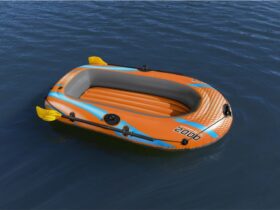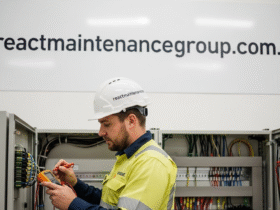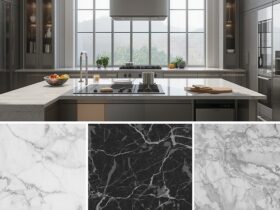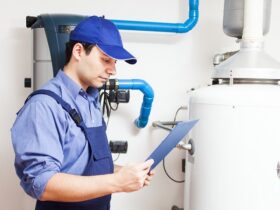Are you fed up with cold showers that seem to last forever? Do you find yourself repeatedly adjusting the tap, hoping for some miracle heat to come through? Maybe you’re worried that the only thing standing between you and a cosy, relaxing bath is a failing hot water system. These questions often come up when you realise how important reliable hot water is for everyday life. After all, nobody wants to wake up to a trickle of lukewarm water when it’s chilly outside.
In this post, we’ll talk about hiring the right plumber to handle your hot water system, whether it’s a repair job or an all-out replacement. You’ll gain tips on troubleshooting basic hot water issues, discover what influences plumbing costs, and figure out if your system is worth fixing or if it might be time for an upgrade. We’ll also look into different types of systems commonly used across Australia. By the time you’ve finished reading, you’ll have the know-how to make informed choices and enjoy a more reliable hot water supply.
Introduction to Hot Water Systems
Hot water is a staple in modern Australian households. Whether you’re looking to wash dishes more effectively or enjoy a comfortable morning shower, your hot water setup plays a critical role. Without it, daily tasks can become inconvenient, and you might quickly start appreciating just how vital steady hot water is. But how do you safeguard this everyday necessity?
Why Do You Need a Reliable Plumber for Hot Water?
Picking a capable plumber for your hot water needs is vital because you want the job done correctly the first time. Damaged pipes or poor installation can lead to leaks, rust, or worse full-blown flooding in your home. A knowledgeable plumber can recognise these potential hazards and address them before they spiral out of control. On top of that, using a reputable professional gives you peace of mind, knowing your family’s safety isn’t at risk from scalding water temperatures or compromised gas connections.
Types of Hot Water Systems Commonly Used in Australia
Australia is home to a few popular hot water system types, each offering its own perks. Electric units typically cost less to install but can lead to larger power bills. Gas systems are faster to heat and can be cheaper to run, although gas lines might not be available in all areas. Solar units harness Australia’s abundant sunshine, though they usually require a higher initial investment. Meanwhile, heat pump systems extract warmth from the air, improving energy usage but also needing specific environmental conditions to work at their best.
Choosing a system often comes down to balancing long-term savings, upfront costs, and your property’s existing infrastructure. While solar might tick the eco-friendly box, you may need to confirm your home can accommodate the panels. Regardless of the system, a trustworthy plumber can help you weigh up each option and guide you to the solution best suited for your needs.
Recognising When to Hire a Plumber
Knowing when to call in a professional plumber for your hot water system often saves time and money in the long run. Little drips, odd sounds, or lukewarm water can be your system’s way of crying out for help. Yet, many people wait until there’s no hot water at all before calling a pro. By learning to spot early warning signs, you can prevent a small drip from becoming a major headache.
Signs Your Hot Water System Needs Urgent Attention
Your hot water system might give you subtle clues when it’s about to fail. Watch for steadily decreasing water temperature, water that takes longer to heat, or discoloured water with a brownish tint. Strange banging or popping noises can also suggest sediment buildup or internal wear and tear. Another critical sign is leaking around the tank or piping.
If you notice any of these indicators, you should act quickly. Prompt action can help you dodge more extensive damage, from serious water leaks to corrosion that requires total replacement. Timely intervention also helps you avoid steep energy bills and ensures you’re not left without hot water on a busy Monday morning.
Repair vs. Replacement: How to Decide
Choosing between a repair and a replacement depends on factors like the system’s age, the extent of damage, and ongoing costs. If your hot water unit is a decade old and frequently breaks down, investing in a new one might be more cost-effective in the long run. On the other hand, if a newer system has a minor issue, a quick repair usually does the trick.
You’ll want to compare the cost of repairs over time to the price of a new unit. If each service call results in temporary fixes, it’s often cheaper to replace the system with something more reliable. A skilled plumber can guide you through the pros and cons, so you can pick the best path for your household.
Costs and Budget Considerations
Money plays a big part in hiring a plumber for your hot water system. From call-out fees to the price of new parts, you should have a plan if you want to avoid surprises. Budgeting ensures you get a decent deal without compromising on safety or quality.
Choosing the Right Hot Water System for Your Home
Selecting a hot water system is about finding quality, efficiency, and a comfortable fit for your unique situation. If you’re investing in a new system, think long term. It’s not just about how much you pay on day one; it’s also about ongoing energy bills and potential maintenance down the line.
Comparing Electric, Gas, Solar, and Heat Pump Options
Electric systems are often the most straightforward, but their running costs may be higher if electricity rates spike. Gas units heat water rapidly and cut down on waiting times. However, if you don’t have a gas line, adding one could be costly. Solar hot water is very attractive in sunny climates, making use of Australia’s bright weather. Even so, the initial outlay might be steep. Heat pumps rely on the ambient air temperature, which can be brilliant in warmer parts of the country, but might lag in cooler regions.
When picking between these options, weigh your local climate and your typical household water usage. Families with heavy usage might benefit from gas or solar, while smaller households in sunny areas may find heat pumps sufficient. Comparing monthly bills for each type can also guide your decision.
Energy Efficiency and Long-Term Savings
Energy efficiency is more than a nice perk—it can be a key deciding factor if you’d like to keep ongoing costs low. Efficient systems often come at a higher upfront price, but they usually pay for themselves over time with reduced bills. For example, solar systems can slash your electricity usage, especially in sunny regions, saving you heaps across the system’s lifespan.
Ask your plumber for advice on energy ratings. Many brands showcase their energy performance, making it simpler to compare models. High efficiency systems also tend to have newer, better-insulated tanks. This means you lose less heat while water is stored, which further cuts down your energy consumption.
Evaluating Plumber Credentials
A plumber’s qualifications help you ensure the person you hire is up to the job. A top-notch plumber can bring a wealth of industry experience, while a less skilled operator could lead to recurring issues or even safety hazards. It’s worth taking the time to confirm your plumber is qualified, insured, and reputable.
Qualifications, Licensing, and Insurance Requirements
In Australia, plumbers need the right licences and certifications to perform hot water system installations. Before hiring anyone, ask to see these documents. It’s your guarantee that they’re properly trained and adhere to local regulations. Insurance is also a must-have, protecting you if something goes wrong during the works. Without insurance, you might be left footing the bill for any accidental damage.
Each state or territory has its own licensing requirements, so it’s wise to check your region’s rules. In many cases, you’ll also find plumbers who are qualified to handle gas-related tasks, which is essential if you’ve chosen a gas hot water system. Verifying these credentials avoids big problems down the road.
How to Check a Plumber’s Reputation and Experience
Online reviews are your friend here. Websites that host customer feedback or professional listings can clue you in about a plumber’s reliability, customer service, and work quality. If your friends or neighbours recently had hot water issues fixed, ask them who they hired and how it went.
Another good way to judge a plumber’s experience is by checking how long they’ve been in business. While a newly qualified plumber might still do a fine job, someone with decades of know-how is often quicker at diagnosing problems. Don’t be shy about asking for references or examples of previous work, especially if you have a large or specialised project.
Maintenance and Troubleshooting
Just like any home appliance, a hot water system needs regular care. By inspecting it from time to time, you can keep it running effectively and prolong its life. Plus, a little upkeep now and then often nips major issues in the bud.
Common Issues and DIY Checks Before Calling a Plumber
Sometimes, unusual noises or lacklustre heating power might be linked to something as simple as a thermostat setting. Checking and adjusting the thermostat is a quick DIY step. For electric systems, ensure the power supply is on, and for gas units, verify the pilot light is lit.
If your water pressure is poor, you can inspect the pressure valve for any obvious blockages. However, if you’re unsure or can’t spot the problem, it’s best to get a professional opinion. Trying to fix complex plumbing issues without the right knowledge can lead to even bigger headaches.
Preventative Measures to Extend System Lifespan
A few preventative measures can help your system last longer. Installing a water filter can minimise sediment build-up if your local water supply has high mineral content. Draining the tank to clear out sediment once every year or two also makes a big difference.
Proper insulation around pipes and the tank (for older systems) reduces heat loss, possibly saving you some money on energy bills. Plus, treating your system gently avoiding extreme temperature settings can spare the internal components undue stress. Simple steps like these can keep your hot water flowing well into the future.
Conclusion
When it’s all said and done, hiring a plumber for your hot water needs doesn’t have to be stressful. By understanding the various system types, early warning signs, and potential costs, you can confidently choose the most fitting option for your home. It’s important to reach out to well-trained professionals, whether you need a new installation or just a minor fix, so you can keep daily life flowing smoothly.











Leave a Review